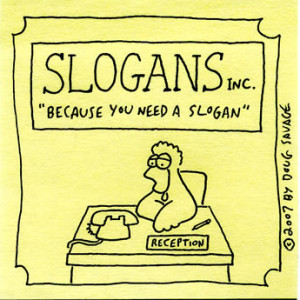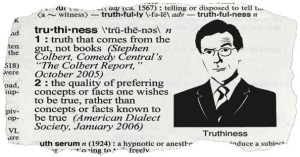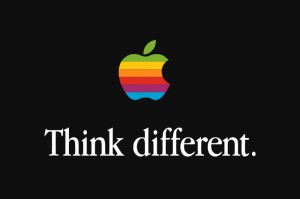– “Drill, Baby, Drill”
– “Eat the Rich”
– “Just do it”
– “Go Green”
– “Abortion on Demand”
– “Black Lives Matter”
– “Black is Beautiful”
– “Better Dead than Red”
– “Don’t Mess with Texas”
– “Make Love, Not War”
– “The Whole World is Watching”
– “One Man, One Vote”
– “War on Drugs”
– “No Taxation Without Representation”
– “The Buck Stops Here”
– “It’s the real thing”
– “The Globally, Act Locally”
And here are some alternate definitions, offered by Merriam Webster, that perhaps apply better to some of the slogans I just listed:
– “A word or phrase used to express a characteristic position or stand or a goal to be achieved.”
– “A brief attention-getting phrase used in advertising or promotion.”
For the purposes of U.S. intellectual history, I think the first of the those two definitions should grab your attention. As an aside, the Wikipedia entry on “Slogan” brings up interesting points for rumination.
In my memory and experience of S-USIH doings, it was LD Burnett—during last year’s S-USIH conference in Indianapolis—who most successfully invoked a slogan-like phrase during her presentation. In recounting the Stanford Debates (or Affair), she discussed relevant history behind the chant, “Hey hey, ho ho, Western culture has got to go!”* LD connected this chant to prior protests from the Civil Rights Movement, or perhaps the Labor Movement. Her goal was to get us to see the long history, and sensibility, invoked by the slogan. The students and protesters at Stanford had a clear position and goal to be achieved.
 Prior to writing this post, I had mentally classified LD’s invocation as a chant. Perhaps she did too. Heretofore, slogans had been classified under my personal mental file of “business rhetoric,” beneath the “marketing/advertising” tab.
Prior to writing this post, I had mentally classified LD’s invocation as a chant. Perhaps she did too. Heretofore, slogans had been classified under my personal mental file of “business rhetoric,” beneath the “marketing/advertising” tab.
What got me rethinking my classification was the renewal of the phrase “abortion on demand” in relation to the latest Planned Parenthood “exposé” on the purported “selling” of fetal tissue (or baby body parts, if you prefer). It’s not a rhythmic chant, but just a slogan—albeit a powerful one that brings to mind consumerism, choice, and selfish desires. I started wondering about the wider staying power of that particular shorthand, as well as its origins and history.
That also starting me wondering about the line of demarcation between a slogan and an aphorism. Intellectual historians take (or have begun to take) aphorisms seriously, but not necessarily slogans or chants. The latter end up being noted in cultural histories. Aphorisms, however, seem to imply deeper, timeless truths and universals.  Slogans are more time-and-place, or to use Stephen Colbert’s term, they possess “truthiness.” It seems clear to me that slogans serve as shorthand truths, or words to live by, for large parts of the population.
Slogans are more time-and-place, or to use Stephen Colbert’s term, they possess “truthiness.” It seems clear to me that slogans serve as shorthand truths, or words to live by, for large parts of the population.
Have intellectual historians done a good enough job contextualizing and tracing them, exposing their sources, deeper goals, and uses (intended or otherwise)? Are slogans taken seriously in works that involve mass movements?
I think future intellectual historians will likely do a lot of work on slogans in the form of hashtags. #BlackLivesMatter has proven to be a powerful slogan over the past year (though created in 2012). And, I would argue, it has been a slogan that has done a lot of good.
What say you about the differences between slogans, chants, and aphorisms? What of their power? What of their use and abuse? How should we “think differently” about slogans in relation the history of thought? – TL
————————————————–
Notes
* Or was it “Hey hey, ho ho, Western Civ has got to go!” I recall the discrepancy, but don’t think I ever settled the exact phrasing for the section in my book on “The Stanford Debates” (pp. 196-201). In that I used William Bennett’s May 27, 1988 National Review piece titled “Why the West?” I should’ve known better than to take Bennett’s phrasing at face value!


7 Thoughts on this Post
S-USIH Comment Policy
We ask that those who participate in the discussions generated in the Comments section do so with the same decorum as they would in any other academic setting or context. Since the USIH bloggers write under our real names, we would prefer that our commenters also identify themselves by their real name. As our primary goal is to stimulate and engage in fruitful and productive discussion, ad hominem attacks (personal or professional), unnecessary insults, and/or mean-spiritedness have no place in the USIH Blog’s Comments section. Therefore, we reserve the right to remove any comments that contain any of the above and/or are not intended to further the discussion of the topic of the post. We welcome suggestions for corrections to any of our posts. As the official blog of the Society of US Intellectual History, we hope to foster a diverse community of scholars and readers who engage with one another in discussions of US intellectual history, broadly understood.
“Hey hey! Ho ho! Western Culture’s got to go!” You have it right in your book — though you’re right to be suspicious of Bennett as a source of anything factual related to the Stanford debates. But in this case his assertion is corroborated. The phrasing was widely reported that way in newspaper accounts from the 1980s. (There were a few news outlets that ran with “Western Culture has got to go,” but I think that had to do with the in-house style of Stanford News Service press releases.) And the Black Student Union’s in-house history of the organization, published in 1989, reproduces the same phrasing.
I found variants of this protest chant — fill-in-the-blank has got to go — from the 1940s to the day before yesterday. For a recent example, see Argus Streaming News, “NightCast from Ferguson, August 20, 2014 #3.”
As you know, I’ve been keeping a lot related to my dissertation pretty close to my vest for a while now, and that guarded reserve is going to have to continue for a little while yet. So I very much appreciate you not going into great detail on my USIH presentation, which touched on an important part of my argument in a key chapter.
I think your linkage of slogans to hashtags is a really interesting one. Some hashtags are purely informational/descriptive — conference hashtags, celebrity names — but others either advance an argument (“Black lives matter”) or set up a scenario for comment/dialog (“If I die in police custody”). Beyond the data sorting function of hashtags, they can do a lot of ideational work in a very compressed space, which does align them with both ad slogans and protest chants.
Thanks for that confirmation in your first paragraph. Like all past and present researchers and dissertators, I *really* appreciate the rabbity-hole style work that goes into verifying facts that seem small to others.
Of course you’re right about some hashtags being merely descriptive. I suppose some slogans are more passive-informational rather than hardworking, like ‘Black Lives Matter’ and ‘Abortion on Demand’. I’ve never looked into the origins of Adbusters Magazine, but thinking of slogans as aphorisms lends new intellectual weight to their project. It’s probably not a surprise that I’m thinking of slogans this way, given my more recent dive into Frankfurt School thinking and Critical Theorists. In fact, the interaction between corporate social media environments like Twitter and Facebook and cultural-intellectual work lends more weight to those past projects (i.e. revolutionary protests are most definitely televised/Tweeted/”posted”—with advertisements trailing subversive messages). – TL
“A good catchword can obscure analysis for 50 years.” — Wendell Willkie
Or catalyze it!
I think the online dictionary definition of “slogan” given at the beginning of the post is somewhat too narrow, as Tim later goes on to suggest. Slogans are used to do more than “attract attention,” a phrase that seems too utilitarian.
Rather, slogans can also express beliefs and convictions, albeit in highly compressed, schematic form. “Workers of the world, unite!” is one example, “liberty, equality, fraternity” another. Another is the state motto of New Hampshire, “Live free or die.” In the 1977 case Wooley v. Maynard, the SCOTUS held that a motorist who objected to this slogan on his New Hampshire license plate had a First Amendment (free- exercise) right to cover it up.
I do think there’s a difference between a slogan and a chant, though occasionally it might be blurry. However, I think I sort of disagree with Tim about the phrase “abortion on demand.” Obviously it’s not a chant, but I also doubt that it should be called a slogan (a slogan to me implies support for what is being ‘sloganized’). Rather, as I understand it, it’s a tendentious phrase used by the anti-choice (or pro-life, if you prefer) movement to describe what they or some of them maintain (incorrectly) was the effect of Roe v. Wade (before it was subjected to various restrictions by states and in subsequent decisions). If this is a wrong reading of the phrase, I’m sure someone will correct me.
The initial definition was just meant to open the conversation, hence the alternate defs that followed.
The difference between a slogan and a chant is rhythm, or a sense of musicality. “Abortion on demand” is not a chant, but rather a belief/conviction repeated often and in different contexts to reinforce the selfishness of women/men who seek the same. It’s a rebuke, in the eyes of true believers, of the personal satisfaction ethic that arose in the 1960s and flourished in the 1970s. It’s a cultural statement as much as something aimed at abortion. That’s how I experienced the phrase when I heard it used by abortion abolitionists. – TL
“It’s a rebuke … of the personal satisfaction ethic that arose in the 1960s … a cultural statement as much as something aimed at abortion.”
That’s interesting; I’m not sure I realized the phrase had these other layers of meaning/suggestion,etc.